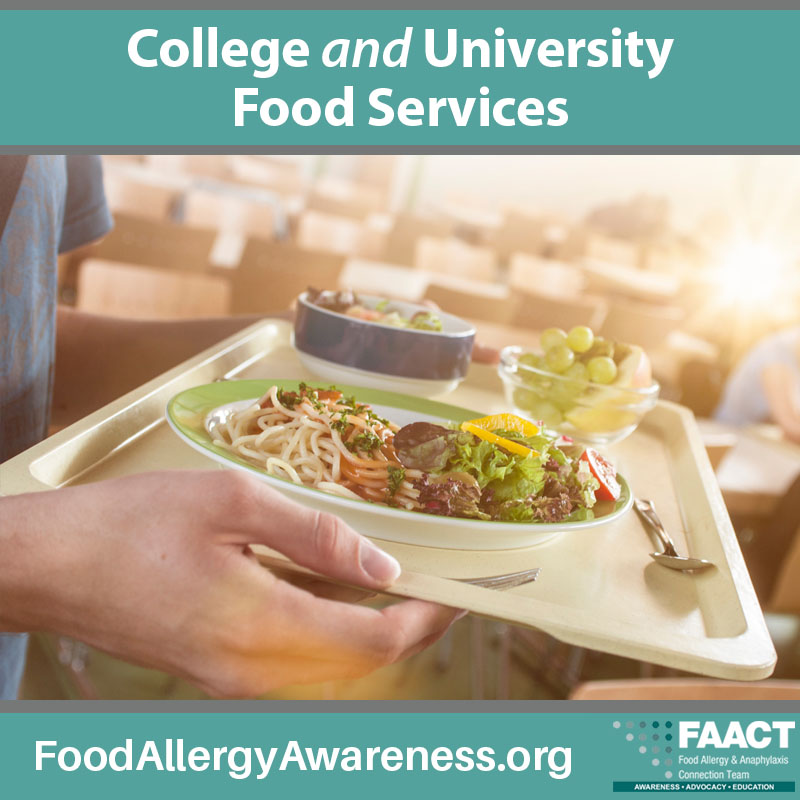Government Relations

FAACT and Managing Food Allergies in College
Whether your child is in currently preschool or high school, you're probably wondering, "How will my child ever manage food allergies in college?"
The college years are a time for any young person, whether managing food allergies or not, to stretch their wings and experiment with independence. That's a great thought except when it comes to our children with food allergies! If you're imagining all the scenarios where food ingredients will be unknown, roommates will be uncaring and dorm rooms will be unsafe - FAACT is here to help you!
We have FAACT employees with experience sending their children to college. We know what works and what doesn't! We'll help you with a toolkit to send your child off to college armed with knowledge of how to stay safe.
In December of 2012, there was big news in the food allergy community about managing food allergies in college. The Lesley University settlement was a settlement agreement with Lesley University and the US Department of Justice. The settlement was in response to a complaint filed in October 2009 that Lesley University violated Title III of the Americans with Disabilities Act (ADA) by failing to make necessary reasonable modifications in policies, practices, and procedures to permit students with celiac disease and/or food allergies to fully and equally enjoy the privileges, advantages, and accommodations of its food service and meal plan system. These students were required to pay to be on the school meal plan, yet not enough food was safe for the students to eat.
Colleges are required to meet the standard of "reasonable accommodations", which is a different standard than K-12 public schools, which are held to the standard of FAPE - Free Appropriate Public Education. The Department of Justice found that Lesley University didn't meet this "reasonable accommodations" standard and mandated that the cafeterias put up signs identifying specific food allergens and gluten (for students with celiac disease). Additionally, the settlement mandated that the school kitchens provide a dedicated space for food preparation for any student concerned about cross-contact with allergens.
The settlement serves as a guideline for all colleges and universities to follow. If you have questions about the settlement, you can contact the ADA for information at 1-800-514-0301 or 1-800-514-0383.
The Disability Services Office (or similar name a college calls this office) is the first place to begin at a college campus. Disability Services generally consider food allergy as a “disability”, and will work with you to discuss your child’s particular situation. The timing of this contact may be best AFTER your child is admitted into the school.
The Disability Office will often refer you to the Housing Office and Dining Services to find out how the school can accommodate your child’s food allergies.
For example, the Housing Office may allow your child to live off-campus, possess a car, “screen” his or her potential roommates, live alone in a dormitory (no roommates), or keep a private fridge in his or her room. However, some colleges have strict policies regarding these topics e.g., freshmen must live on campus, cannot own a vehicle, etc.
Dining Services generally have registered dietitians (RDs) on staff who can help incoming students with food allergies or other dietary issues. Dining Services also generally allow students to meet with food service staff (chefs, managers, etc.) to discuss menu items and food preparation techniques. Some colleges have been known to allow you to “opt out” of the meal plan; however, this is a rare occurrence.
Stock epinephrine entity laws, e.g. public venues, include colleges and universities. States that have current college and university-specific undesignated stock epinephrine legislation:
Remember, FAACT is here to help you and your child to safely manage food allergies in college AND to help you enjoy the process!
For more information on Colleges and Universities, contact Eleanor Garrow-Holding, President and CEO.